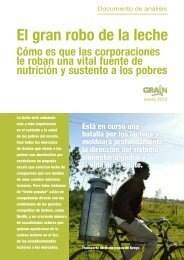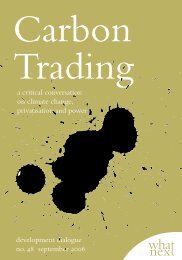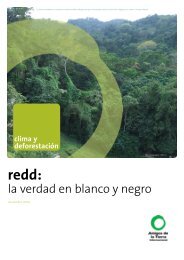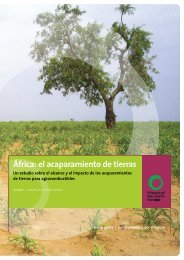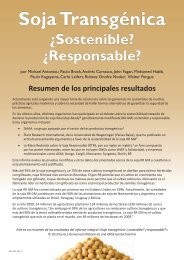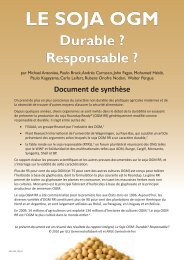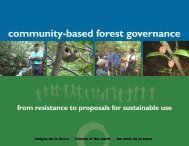Plantations, poverty and power - Critical Information Collective
Plantations, poverty and power - Critical Information Collective
Plantations, poverty and power - Critical Information Collective
You also want an ePaper? Increase the reach of your titles
YUMPU automatically turns print PDFs into web optimized ePapers that Google loves.
23<br />
credit crunch, unstable oil prices (which were high earlier in 2008, but are currently low) <strong>and</strong> the threat of<br />
a world recession will affect how easy it is for companies to raise capital. Economic recession means<br />
reduced consumption of paper globally. However, pulp <strong>and</strong> paper companies don’t only raise money<br />
when they plan new projects such as new pulp mills or new plantations. Much of the finance that pulp<br />
companies raise is not directly project finance. Financing comes from issues of shares or bonds as well as<br />
general corporate financing.<br />
Private equity funds have started buying up pulp <strong>and</strong> paper companies. Madison Dearborn Partners one of<br />
the biggest private equity companies in the US owns stakes in Boise Cascade, Buckeye Cellulose,<br />
Graphic Packaging Corporation, Packaging Corporation of America <strong>and</strong> Smurfit Kappa. 80 In 2005,<br />
Cerebus Capital Management bought MeadWestvaco’s paper business for US$2.3 billion 81 setting up a<br />
new company called NewPage. Stora Enso subsequently sold off its north American operations to<br />
NewPage. 82<br />
Since 2004, Finnish consulting firm Pöyry has organised a yearly event for private equity investors in<br />
London. During Pöyry’s “private equity breakfast”, representatives of private equity companies meet at<br />
Claridges Hotel to eat a traditional English breakfast while listening to Pöyry’s “views <strong>and</strong> perspectives<br />
on the opportunities emerging throughout the forest industry value chain”.83<br />
Private equity is based on capital raised from private sources rather than on the public stock exchange.<br />
Private equity firms aim to buy companies cheaply, asset strip <strong>and</strong> sell as quickly as possible for as large<br />
a profit as possible. Or, as Pöyry puts it, “The ownership time horizon of private equity is limited <strong>and</strong><br />
there is always an exit strategy in mind. Compared to traditional investment companies, private equity is<br />
not a silent investor <strong>and</strong> actively influences the performance <strong>and</strong> strategic direction of management.” 84<br />
If private equity firms were to start taking over large scale pulp operations <strong>and</strong> industrial tree plantations<br />
in the global South, running them purely for short term profit, the social <strong>and</strong> environmental impacts could<br />
be even more severe than at present.<br />
Increasingly though, pulp <strong>and</strong> paper companies are selling off assets as a way of raising finance. In 2005,<br />
for example, International Paper started to sell off the forests <strong>and</strong> plantations which provided its raw<br />
material. Before the sale, International Paper was the world’s second largest private l<strong>and</strong> owner. 85<br />
International Paper’s sale of its forests <strong>and</strong> plantations reflects an industry trend. Pulp <strong>and</strong> paper industry<br />
analyst Dennis Neilson notes that<br />
“In recent years there have been many new investment funds <strong>and</strong> companies from Europe <strong>and</strong> North<br />
80 Bernard Simon (2005) “Sector that’s suffered a bit of a pulping”, Financial Times, 28 June 2005.<br />
“Portfolio”, Madison Dearborn Partners website, http://www.mdcp.com/portfolio.asp<br />
81 James Politi (2005) “Cerberus to buy MeadWestvaco paper arm”, Financial Times, 19 January 2005<br />
82 Vidya Ram (2007) “Stora Enso Finds American Exit Route”, Forbes, 29 September 2007.<br />
http://www.forbes.com/markets/2007/09/21/stora-enso-newpage-markets-equity-cx_vr_0921markets04.htmlpartner=links<br />
83 Cormac O’Carroll <strong>and</strong> Aestan Orstadius (2007) “Private equity breakfast with Pöyry in London”, Know-How Wire, Pöyry<br />
Client Magazine, 2/2007.<br />
84 Cormac O’Carroll <strong>and</strong> Aestan Orstadius (2007) “Private equity breakfast with Pöyry in London”, Know-How Wire, Pöyry<br />
Client Magazine, 2/2007.<br />
85 Jeremy Grant <strong>and</strong> Dan Roberts (2005) “Oil prices pump up costs”, Financial Times, 25 July 2005.



